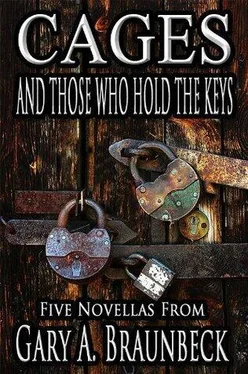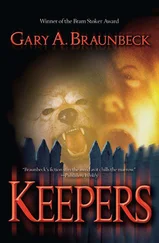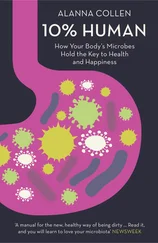He felt his arm slowly start to drop, then just as quickly remembered Jerry’s warning: don’t let your heart or hand be swayed by its appearance, that’s what Gash wants.
Martin closed his eyes, turned the baby’s head to the side, and smashed its skull into pulp with three powerful strikes. His ears filled with the sound of a melon hitting the pavement after being dropped from a great height, and he almost threw up, but then a great jolt like an electric shock shot up his arm, throwing him back against the wall and flipping the flashlight through one of the shattered windows.
The baby jerked and spasmed, thrashing against an ugly light engulfing its body, causing it to flicker and sizzle and—very quickly, at the end—fold in on itself like a film negative set on fire and implode into nothing.
At the same moment, the painting on the wall rippled and bulged, pushing outward like a bas-relief work before deflating, flattening out . . . and returning to the way it had been: a field of faces, looking out at something only they could see.
Martin sat up, pulling his knees to his chest and folding his arm around them.
“You did it,” said the little boy.
Martin lifted a hand and waved him away: not yet, please, just . . . not yet . “You’re not finished.” “I know . . .” “You gotta—”
“ I know! ” And as much as seeing the false images of his parents had nearly shattered him for good, what he had to do next was worse.
Burn the painting , the letter had said.
Burn it right away and get the hell out.
Martin staggered to his feet and grabbed the box of magazines and newspapers and painting supplies, scattering the papers and opening the jar of kerosene that had been used to clean the paint brushes. He poured the liquid over the papers, onto the floor, and splashed the remainder onto the wall and the painting. Pulling his lighter from his pocket and flicking open the lid, Martin looked at the little boy and said, “You need to leave.” “I know. I’ll be going with you. If you want me to.” “That would be nice, yes.”
The little boy smiled. “ Cool .”
Martin took a deep breath, struck up the flame, took one last look at the painting that no one else but him had ever seen or would remember, then tossed the lighter into the papers and, per Jerry’s instructions, ran like hell.
It took less than three minutes before the rooms were engulfed in flames.
Five minutes later, the entire second floor was ablaze.
In the end, it became a four-alarm fire that razed the entire building. Firefighters fought for nearly six hours to get it under control, finally extinguishing the last remnants of the conflagration around 6:45 a.m.
By then Martin had made an anonymous 911 phone call about the body in room 401 of the Taft, hightailed it back to his apartment, taken a shower, put on clean clothes, and applied fresh peroxide and bandages to his various wounds.
Then he sat on his couch and waited.
8
They came for him at 7:30. The officer pounded on the door twice, then shouted: “Martin Tyler, this is the police. Open up now.” Martin complied. The officer pushed him back into the room, was joined by his partner, and they were joined by Barbara Hayes.
“What the hell did you think you’d accomplish by running out like that?” “You wouldn’t believe me,” said Martin as the officers cuffed his hands behind his back. Dr. Hayes looked at him and shook her head. “I’m sorry it has to be this way, Martin, but there are rules.” “I know.” He was alive. He had done it.
Damn had he done it!
“How irked is Ethel?” he asked as they led him out to the police cruiser.
“Oh, you’ll be finding out soon enough, I think,” said Dr. Hayes.
After the officers had gotten Martin safely into the back seat, Dr. Hayes leaned down and said, “There are consequences for certain actions, Martin. You’re not being charged with any crime, but you just bought yourself the entire ten days at The Center.”
“I figured.”
She looked as if she were going to chew him out some more, but then her eyes softened, her face filling with something . . . something . . . not her.
“There will be other circuses for you, Dipshit,” she said in a voice that could only have been Bob’s—because it wasn’t Jerry’s, and it sure as hell wasn’t hers. “There will be cotton candy and funnel cakes and calliope music. There are always tomorrows, soldier, and other battles done; music in the square, women under flowered trees, as summer slides into soft decay, leaf unto leaf . . .”
Then she stopped, blinked, and gave her head a little shake before looking at Martin again. “You screw up, you deal with the consequences. That’s life.”
“Yeah,” said Martin, barely able to contain himself. “It sure is, isn’t it?”
The cruiser pulled away, taking him back to Buzzland.
Martin looked out the window at the morning world. The sun broke through the heavy thick clouds still lingering from the downtown fire, shining directly into Martin’s eyes.
And larks into falcons rise
from the yellow sleeves of eternal day.
He wished peace to Bob, bade the Substruo much luck, and sent his parents his love.
A new day, a new world. Yet again.
And again.
And again.
The yellow sleeves of eternal day , he thought.
Bring it on.
The Ballad
of Road Mama and Daddy Bliss
“Well it’s a winding highway that never seems to end…”
—Rory Gallagher, “Lonesome Highway”
“…Abe said, ‘Where you want this killin’ done?’ God said, ‘Out on Highway 61…’” —Bob Dylan, “Highway 61 Revisited”
It could have been a scene from any drive-in B-feature from the 1950s or early 60s featuring juvenile delinquents as Everyman and drag racing as heavy-handed social metaphor:
FADE IN: a seemingly endless stretch of smooth two-lane blacktop emptying into shadows. Crowds of people line both sides of the road, the men looking tough while clutching at their bottles of beer, the women looking anxious while clutching at the filtered tips of their cigarettes, and the kids—especially the really young ones—looking like they aren’t sure how they should be feeling while they clutch at the hands or coats of the tough beer drinkers and anxious cigarette smokers.
There are dozens of cars parked at haphazard angles off to the side, their headlights illuminating two vehicles that crouch rumbling in the center of the strip, rabid animals straining at the leash. A YOUNG GIRL, early twenties (if that), dressed in a skirt and tight short-sleeved sweater, blonde hair pulled back into a ponytail, a scarf tied around her neck, stands a few dozen feet from the front of the cars, raising her arms above her head with a slow dramatic relish, a bright red kerchief clutched in each of her hands…
I was trying very hard to imagine all of this as being a scene from a movie that I was watching, half-expecting one of the SUPPORTING CHARACTERS to scream something profound like, “Burn rubber, Daddy-O!” so I could smile at all the clichés being firmly in place. If I could achieve some kind of half-assed Zen state, if I could convince myself that I wasn’t really a part of all this, if I could delude myself into believing that I was just viewing it from a safe distance, then I might be able to survive the next two minutes with mind and body in one piece—providing I could force myself to overlook the physical appearance of most of the spectators, or the thing that was driving the car I was about to race against. I could try focusing on the blonde girl who was about to signal the start of the race, but that would mean looking at her arms, both of which were easily a foot longer than a normal arm is supposed to be, her elbows having been replaced by the type of steel hinges used to fasten car hoods to their vehicles; what sinew, veins, and muscle remained to connect her forearms to her biceps wound through and around the hinges like vines, all of it kept functional with a combination of machine grease and petroleum jelly.
Читать дальше












